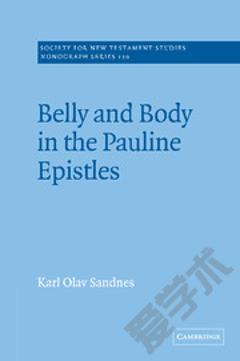Belly and Body in the Pauline Epistles
The belly is today a matter of much concern. Modern cultures, particularly in the West, have developed means to cultivate this part of the body: corsets, exercises, revealing fashions. In this compelling exploration of the 'belly' motif, Karl Olav Sandnes asks whether St Paul might be addressing a culture in which the stomach is similarly high on the agenda. The result is a surprising new insight into his writings. Paul twice mentions the enigmatic phrase 'belly-worship' (Phil 3; Rom 16). The proper context for these texts is the moral philosophy debate about mastering the desires, and the reputation of Epicurus' philosophy as promoting indulgence. The belly became a catchword for a life controlled by pleasures. Belly-worship was not only pejorative rhetoric, but developed from Paul's conviction that the body was destined to a future with Christ.
{{comment.content}}








 京公网安备 11010802027623号
京公网安备 11010802027623号